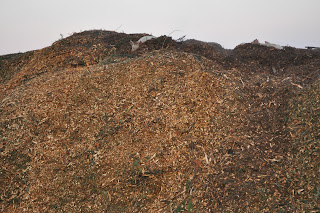I'm very interested in where my food comes from, and I'm very interested in how it gets produced. In fact, I'm so interested that I started farming mostly as a reaction to the anonymity of the food that most of the US consumers eat.
But I'm pretty extreme -- not everyone starts their own farms to eat better. Most people who are concerned about animal welfare use the words on the packaged food to inform them about their food, and that's a good thing. Informed choice driving your purchases is how you can make a direct change to our food industry.
One of the most widespread types of certification is that offered by the USDA, specifically the USDA Organic Certification process.
I'm not going to go into the details of how you get certified, or talk to you about what the standards are, or whether they're worthwhile, or even if it's been co-opted by industry. Those are all valid topics but I'm going to focus on one thing here:
Whatever the standards are, I think it's very important that people actually follow them.
If you promise me that you're certified organic I, and every other customer of yours, have every reason to expect you to follow the guidelines and maintain the standards.
Doubts about the USDA Organic certification
The primary problem that I've had with the USDA Organic label is that they have had several instances where food producers have not followed the standards of production, the USDA has been put on notice that they have not, and it has taken
YEARS in some cases for any action to be taken.
Let me repeat: Known violations, claims that the products are organic, no consequence to the producers.
Typically food that is labeled organic is sold at a higher price than food that is not, so there's actually an economic advantage to be had by labeling food that is produced non-organically as organic. This has shown up at farmers markets, for instance, where vendors have been
buying conventionally produced produce and selling it as local, organic produce, and pocketing the difference.
This was the case with an Oregon man, Harold Chase,
who made more than $450,000 selling corn that he claimed was organic, which turned out to be conventionally raised corn. This corn was used to produce "organic" animal feed and products. That $450,000 he made was the markup that organic corn is given over conventional corn -- it's pure profit. When you can make that kind of money in a relatively low-profit business like farming, you'll see more of this. The economic incentive is just too big.
Our food system is made up of a whole chain of people, and when
any link on that chain is compromised it makes the efforts of everyone else worthless.
Lets imagine that everything along the whole chain went right. The food was produced organically, it was correctly harvested, it was shipped and stored correctly, and it arrived into the back of your local supermarket in perfect shape.
It can get messed up right before you buy it. Here's an example of
organic produce being mixed with conventional, in violation of the USDA Organics rules. Yes, it might seem that stacking organic and non-organic vegetables next to one another is no big deal, but again
If you claim organic certification, I expect you to follow the rules
My single largest complaint about the USDA Organics program is that the enforcement of the rules and the investigation of the violations isn't effective enough to give me any confidence that the standards are being upheld at any point in the supply chain.
Here's what you can do to help
The easiest place to start is going to be at farmers markets. I'd like you to take the time to ask the vendors about their farms and their practices -- specifically, if they're certified USDA organic. If you notice a vendor that seems a little vague about their product practices, talk to the manager at the market about your concerns, and take the time to report your concerns to the USDA.
Yes, you may report people who are indeed organic, but it's also true that this sort of report is often the ONLY way that the violators are caught. Error on the side of caution. Expect that they follow the rules.
Report suspected USDA Organic violations
























































